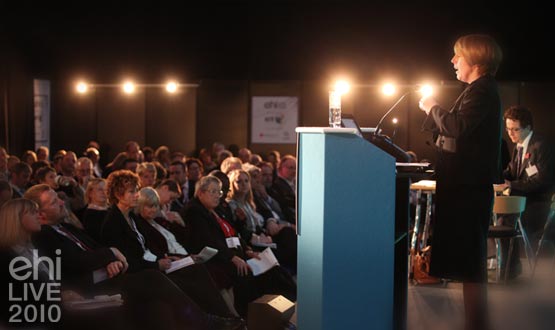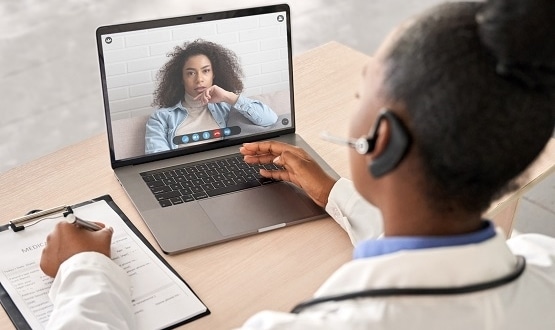Live issues
- 11 November 2010

There were two solid days of debate and discussion at eHealth Insider Live 2010. Yet as far as primary care IT was concerned, there were still plenty of questions to be answered at the end of it.
The reason was summed up in a comment from Christine Connelly, NHS director general for informatics, when she spoke near the end of the event.
“The information strategy is incredibly light on anything to do with technology,” she told an audience member looking for some detail on technology in the soon-to-be reorganised NHS.
Hot on vision
Health secretary Andrew Lansley published his white paper, ‘Equity and excellence: Liberating the NHS’ in July, triggering another round of health service re-organisation that will see strategic health authorities and primary care trusts abolished and commissioning passed to GP commissioning consortia.
The white paper promised a consultation on a new information strategy for the NHS, which the Department of Health issued in October.
The consultation document, ‘Liberating the NHS: an information revolution’, set out a vision for building new information sources for clinicians and patients on the bedrock of individual patient records.
However, it failed to discuss the technology that creates and stores these records; or how the health service will move forward with IT following the effective end of the National Programme for IT in the NHS.
Connelly told EHI Live 2010 it had been a deliberate move to put information rather than IT at the forefront of the document. She said the idea was that IT would be seen not as an end in itself, but as an enabler for the delivery of the information revolution.
However, the lack of detail in the white paper and the consultation on how the NHS will be structured and how its IT will be organised was clearly causing problems for some of the NHS IT professionals, clinicians and suppliers at the conference.
One supplier of an innovative new IT solution that passes clinical information from hospitals to practices told EHI Primary Care that all the primary care trusts he had seen loved the product. Unfortunately, they admitted they would not be the purchasers in future.
“How will these new GP commissioning consortia work? Will they be in effect run by PCT managers or doctors? And when will they start working? At the moment it’s very frustrating,” he said.
From the other side of the field, Bedfordshire GP Dr Mary Hawking wanted to know how consortia were going to manage their technology. She was concerned that there would be no answers by 1 April, 2013; when the white paper says the new consortia will start working in full.
In response, Connelly promised that the current consultation on an IT strategy due to end in January would be followed by the publication of the strategy itself approximately two months later.
She also commented that although the white paper plans involved “a very challenging timetable” the aim was to work with others to design and develop achievable plans to deliver the proposals.
She added: “We’re working very closely with Barbara Hakin [NHS managing director of commissioning development] on the development of the GP commissioning consortia. It’s an iterative process of what’s possible and what’s required by GP consortia.”
Working on the detail
Elsewhere at EHI Live, two key themes emerged – the need for more innovative use of health services information and the need for common standards to enable information sharing and deliver the government’s ‘connect all’ strategy.
Tom Steinberg, the founder of the charity MySociety, which has developed such sites as Fix My Street and They Work For You, said the health arena in the UK was lagging behind others in using public sector data.
He added: “When people talk about making data open in the public services they mostly think about the data being analysed and presented as pie charts and graphs. But it’s not about that traditional statistical role but about how we can use that data to create services that people want.”
Steinberg told EHI Live that the sites developed by MySociety such as What Do they Know? – which logs Freedom of Information requests and replies for public use – were about “taking a private interest and turning it into a public interest”.
While perhaps 1,000 new FoI requests are made through the site each week, 30,000 people visit to read the responses generated by others.
He added: “These kinds of services have been very slow to happen in the health service. You need to think about what you could do with these datasets that’s different from the purpose they were collected for.”
Steinberg also suggested GP commissioning consortia should use the government’s promise to publish public sector contracts to press for a system where all consortia contracts were available for others to view. He said this would enable consortia to learn from each other on who was getting the best deals and how.
Health minister Simon Burns also focused on health information in his speech. He argued that the NHS needed to make much greater use of information and told his audience “we are missing a very big trick” in not making use of the data that was already available.
Many conference goers were disappointed not to hear more on technology from Burns. But others welcomed the promises that were in the speech.
Tim Benson, founder of healthcare computing company Abies, said he hoped the minister’s promise of “an environment in which innovation can flourish” would be translated into a much faster and slicker procurement system for the NHS.
He told EHI Primary Care: “I hope that means the era of three year procurements will be well and truly at an end.” Benson also saw good news in Burns’ promise of a “locally-led, clinically driven” health service which he hoped would mean IT decisions being made by clinicians rather than general managers.
Just doing it
One successful illustration of that was presented by Dr William Lumb, a GP in Cumbria. His local doctors’ decision to invest in IT has helped their commissioning group deliver some very impressive savings.
Another area delivering on what the white paper envisages is Herefordshire, which was the first county in England to integrate its council and NHS IT services.
Zack Pandor, joint director of ICT in Herefordshire, told the conference that the result had been cost savings of 10% as well as benefits in skills sharing, staff development and greater resilience.
For those itching to follow suit with further innovations the message from the centre was that a pragmatic approach would be taken to enable different solutions to evolve across the country. For more details on how that will work, protagonists may have to wait until the spring.




